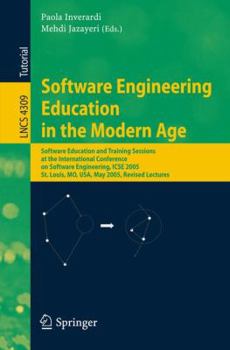Software Engineering Education in the Modern Age: Software Education and Training Sessions at the International Conference, on Software Engineering, I
Software Engineering is a multifaceted and expanding topic. It aims to provide theories, methods and tools to tackle the complexity of software systems, from development to maintenance. Its complexity is made even more severe today by rapidadvancesin technology, the pervasivenessofsoftwareinallareasofsociety, and the globalization of software development. The continuous expansion of the ?eld presents the problem of how to keep up for practitioners. For educators, the key questions are how should software engineers be educated and what are the core topics and key technologies? Even looking only at the last decade, the tremendous changes that have taken place in the software engineering industry, and in the industrial world in general, raise many questions. What are the e?ects of: Outsourcing?Distributed softwaredevelopment?Opensource?Standardization?Softwarepatents?Mod- driven development? How should these developments change the way we teach softwareengineering?Shouldtextbooksbeupdated?Shouldsoftwareengineering play a di?erent role in the computer science curriculum, for example, be more pervasive? How are instructors in universities handling these issues? All these issues were discussed at the Software Education and Training s- sions at the International Conference on Software Engineering (ICSE 2005) by leading researchers, educators, and practitioners in software engineering, who presented their--sometimes controversial--views and insights on software en- neering education in the new millennium. In this volume we have collected some of the most representative and innovative approachesthat were presented at the workshop. The authors revised their papers based on discussions at the conf- ence and the comments they received from the reviews.
Format:Paperback
Language:English
ISBN:3540682031
ISBN13:9783540682035
Release Date:December 2006
Publisher:Springer
Length:208 Pages
Weight:0.75 lbs.
Dimensions:0.5" x 6.1" x 9.1"
Customer Reviews
0 rating





